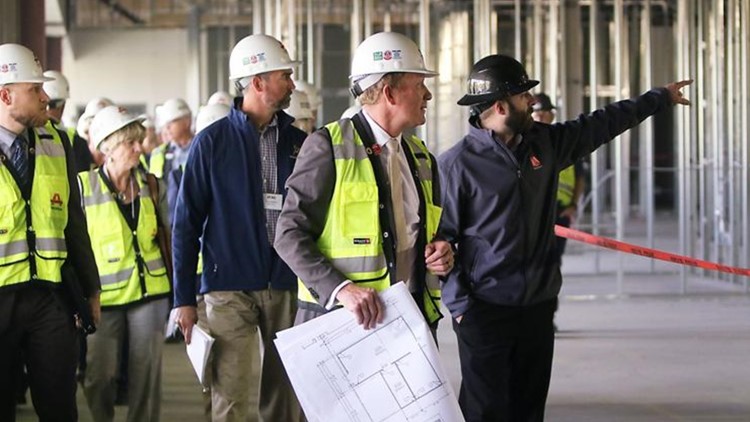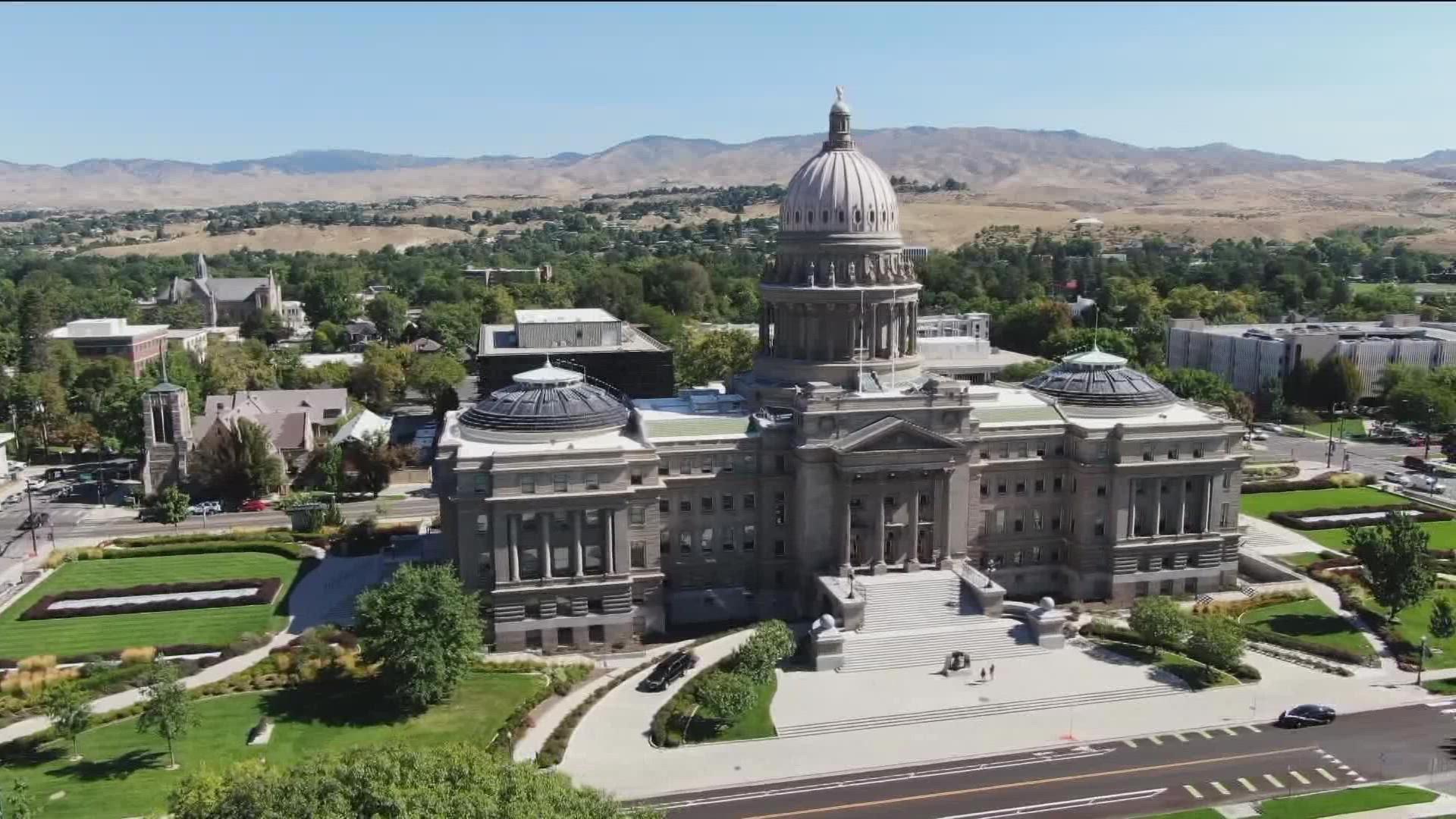BOISE, Idaho — This article originally appeared in the Idaho Press.
Big budget decisions made by the Legislature’s joint budget committee on Monday call for the state to tap into its budget surplus for $176 million to pay off all but one of its outstanding bonds; route $300 million in federal aid funds over the next five years to local water and sewer upgrades for rural Idaho communities; and fund an array of capital construction projects.
“By paying off that debt, we … avert $63 million in interest payments over the next 30 years,” said Alex Adams, Gov. Brad Little’s budget director. “So that means real savings to Idaho taxpayers.”
The bond payoff plan won the unanimous support of the Legislature’s Joint Finance-Appropriations Committee on Monday, as budgets were set for the state Department of Administration and the state’s bond payment program; the state Department of Environmental Quality; and the Permanent Building Fund, covering the big capital projects Idaho will fund this year and next.
Budget bills still need passage in the full House and Senate and the governor’s signature to become law, but they rarely change once they’re set by the 20-member Joint Finance-Appropriations Committee.
Sen. Jeff Agenbroad, R-Nampa, JFAC co-chair, said, “I strongly support Idaho’s decision to use a portion of our surplus to pay down our debts. This is good conservative budget policy that is recognized by those who have rated Idaho amongst the most fiscally conservative and transparent states in the nation.”
The early payoff of 13 outstanding bonds covers everything from higher education buildings around the state to a parking garage north of the Capitol to the Chinden state office complex, formerly the Boise Hewlett-Packard campus. The bonds otherwise would have had payoff dates ranging from 2023 to 2048.
The state also will see ongoing savings on debt service of $4.3 million a year, and, freed of the annual bond payments, the state’s Permanent Building Fund will have about 40% more per year in available revenue to spend on state building construction and maintenance, or nearly $14 million a year more.
Idaho has an unprecedented budget surplus this year of nearly $2 billion. That’s made this year’s state budget-setting a different kind of project than usual. The $176 million bond payoff program, tapping the state general fund, was approved as a supplemental appropriation, to allow it to happen in the current budget year; Idaho’s new fiscal year begins July 1.
Adams said the governor is working to put the state on a path toward paying off all its deferred maintenance costs on state buildings over the next 10 years.
The one remaining bond debt Idaho will have is for a skilled nursing facility in Blackfoot operated by the Idaho Department of Health and Welfare; the federal government, rather than the state, would have realized any savings from paying that bond off early, so lawmakers didn’t include it for the state-funded early payoff.
Here are other major budgets approved by the joint committee on Monday:
ENVIRONMENTAL QUALITY
The DEQ will see a budget that’s 101.7% higher in total funds next year compared to this year, but that’s nearly all because of the one-time use of federal aid funds that will pass through the department. That includes $60 million next year for grants for major local drinking water and wastewater upgrades, the first installment on a five-year, $300 million investment; and $13.7 million for cleanup of contaminated sites across the state.
JFAC included “intent language” in the budget that was suggested by the House Environment, Energy and Technology Committee for the water and wastewater grants, giving priority to systems “with the greatest level of need, but least ability to pay.”
The DEQ this year received 263 letters of interest from around the state, totaling more than $1.4 billion for water and wastewater projects. The largest request in that group was for $546 million from the city of Boise.
But after Monday morning’s meeting, DEQ Director Jess Byrne said based on the budget language, “I think it’s highly likely that Boise might not end up qualifying, based on how much money is available and how large their request is.”
Adams noted that the budget also includes $44 million for state matching funds for $407 million in additional federal aid headed to the state for water projects under the infrastructure act that Congress approved this year, which would go out as low-interest loans.
“So there’s certainly opportunities out there, between the grant dollars and the loans,” he said. “I think communities throughout the state, regardless of size, will have multiple options to work with.”
The joint committee also approved supplemental appropriations to DEQ this year including $5 million in state general funds for agricultural best management practices, boosting an existing program; $5 million from the general fund for matching grants for pollution-control improvements at confined animal feeding operations; and $1.45 million from federal American Rescue Plan Act aid funds for continued remediation at the Triumph Mine.
That abandoned mine, located about 6 miles southeast of Sun Valley, produced lead, zinc and silver from 1882 to 1957, but after a 2005 bankruptcy, the state took over responsibility for ongoing cleanup, with lots more work still to go.
Rep. Ron Nate, R-Rexburg, railed against tapping the federal American Rescue Plan Act aid funds for the mine cleanup. “This is ARPA money,” he said. “This is money borrowed from our grandchildren. … We’re diverting resources away from what the people would want.” He said, “It seems like free money, but it is a diversion of resources and it is coming from families toward these government programs.”
Rep. Rick Youngblood, R-Nampa, responded, “I believe I’m a federal taxpayer as well, so I’m very excited about using these federal funds where they need to be used, one-time.” He noted that he’s toured the Triumph Mine several times. “This is an excellent use of those funds to take care of an environmental hazard that the state of Idaho is responsible for,” he said.
The supplemental appropriation passed on an 18-2 vote, with just Nate and Rep. Priscilla Giddings, R-White Bird, voting no.
STATE BUILDINGS. JFAC approved a Permanent Building Fund budget for next year that includes $211.5 million in building and maintenance projects, including $94 million for deferred maintenance projects statewide, which is $6 million less than the governor proposed; $29 million toward a new combined laboratory facility for the Idaho State Police; $10 million for a health science building on the College of Western Idaho’s Nampa campus; $5 million for a CWI horticulture building; and much more.
The budget motion passed unanimously, 20-0. It doesn’t include two large building proposals that will be taken up separately: $161 million in state prison construction projects, including a new $112 million women’s prison; and $75 million for improvements to Idaho’s state veterans homes.
Also left out was a $10 million project Little had recommended, to build a new dormitory at the POST Academy, the state’s peace officers training academy.
Rep. Rick Youngblood, R-Nampa, JFAC co-chair, said, “When we looked into it, they’ve got a contract with two local hotels,” that he said only costs the state about $60 a night. Youngblood said lawmakers concluded that made more sense than spending $10 million on a new state building. “It’s very efficient,” he said.
Adams said the governor thought it “made sense for the state to have its own facility and not have to rely on local hotels, but we certainly respect the decision that JFAC made.”
This article originally appeared in the Idaho Press, read more on IdahoPress.com.
Watch more Local News:
See the latest news from around the Treasure Valley and the Gem State in our YouTube playlist:



